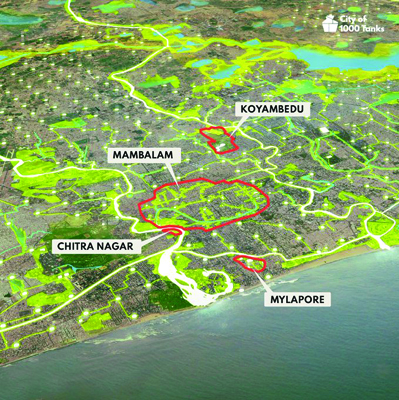R ARIVANANTHAM
CHENNAI, OCT 7
City of 1000 Tanks team, comprising international and local experts, have developed a strategy – Chennai-Wide Water Balance Model – to minimise and eliminate the wastage of water in the city. A pilot has already been initiated at Little Flower Convent in Mambalam in the city.

Chennai is staring at a risk of running out of water in the next decade and the City of 1000 Tanks has an immediate, midterm and long-term vision for the city’s water security, said Sudheendra NK, Director, Madras Terrace Architectural Works.
- Over 150 children from 10 settlements have been identified as potential ‘water ambassadors’ who will raise awareness related to water conservation in their areas.
- Additionally, we discuss the past, present and future of water in Chennai through a 6-part animation film series prepared in Tamil and English
Speaking to reporters, Mr. Sudheendra said the team comprising – OOZE Architects, Madras Terrace, Care Earth Trust, IIT Madras, Biomatrix Water, IRCDUC, Uravugal Social Welfare Trust, Paperman Foundation, Goethe Institute, Chennai and TU Delft University of Technology, Netherland – will develop a Water Balance Model across the city by collecting rainwater, treating wastewater and runoff pollution with decentralized Nature-Based Solutions, and by recharging the underground aquifer.
https://youtu.be/S-kRZG4x3zk
Based on the model, the project will harvest and treat wastewater and runoff pollution before recharging into the underground aquifer. The project will engage collectively with residents, local businesses, institutions, and government bodies.
A Chennai-wide water balance model will be achieved through an incremental implementation process, he said and added Starting with pilot projects, then upscaling to flagship projects before effective city-wide implementation.
“‘Each upscaling stage is an opportunity to build capacity and improve performance in order to demonstrate inclusive implementation for a water rich Chennai,” he said.
The ongoing Water Balance Pilot at Little Flower Convent, Mambalam, will be a proof-of-concept of the scalable Water Balance Model. It will further demonstrate a Chennai-specific implementation of all key elements within the project such as septic tanks, constructed wetlands, bioswales and detention parks.
The Pilot will be up-scaled to the various City of 1,000 Tanks Flagship projects implementing and ensuring water security at increasing scales while leaving no one behind.

The initiative will help prevent droughts by increasing groundwater reserves while simultaneously mitigating risks associated with high frequency floods and sewage pollution. This project intends to fix supply-side issues by creating water retention and supply capabilities of 200-250 MLD (Million Litres per Day) in the first two phases of the project (out of the current 1,580 MLD urban demand).
Ongoing media campaigns – Water literacy programmes
Since March 2021, the team has been implementing a water literacy programme for children from informal and low-income settlements across Chennai and as a result over 150 children from 10 settlements have been identified as potential ‘water ambassadors’ who will raise awareness related to water conservation in their areas.
Simultaneously, since 14 July 2021, ‘City of 1000 Tanks’ has launched a social media campaign. Here we have published a combination of completed activities with designs created for future projects. Additionally, we discuss the past, present and future of water in Chennai through a 6-part animation film series prepared in Tamil and English. The Social Media Campaign and ‘Water ambassodors’ programme of the City of 1000 Tanks are funded by the Goethe-Institut /Max Mueller Bhavan Chennai through its Excellency Project.
Addressing the reporters through video conference, Eva Pfannes, Team Lead, City of 1000 Tanks, Director and Partner, OOZE Architects & Urbanists said ‘Every drop counts: City of 1000 Tanks rewires natural dynamics and deploys nature within the city as an interconnected system of many water infrastructure units that together collect and treat all water -rainfall and consumption– and resupply it as an equitable and co-owned resource to communities’.
Sylvain Hartenberg Director and Partner, OOZE Architects & Urbanists said ‘City of 100 Tanks works towards a ripple effect: A future scenario will not be built at once, but will grow incrementally. This first Water Balance Pilot, starting now, will be followed-up by flagship projects and other schools, all tied to a coherent large-scale strategy accompanied by a communication campaign’.
The project Commissioners for the Phase 3 Pliot project is – Netherlands Enterprise Agency (IRVO.nl) on behalf of the Ministry of Foreign Affairs Henk Ovink, Special Envoy for International Water Affairs and supported by the 100 Rsilient Cities, Dutch Ministry of Infrastructure and Water Management; Global Centre of Excellence on Climate Adaptation; UN/World Bank – High Level Panel on Water and Partners for Resilience (PIR).
The main contractor of the 3 pilot projects is OOZE Architects (Eva Pfannes, Sylvain Hartenberg, Jesse Honsa, Nilofer Tajuddin, Kate unsworth, Elif Soylu and Mathai Hsoc George.
The local team consists of – Madras Terrace (Shilesh Hariharan, Archana Y and Sudheendra K); Care Earth Trust (Jayshree Vencatesan); IIT Madras (Dr Balaji Narasimhan, Dr Indumathi Nambi): Paperman Foundation (Mathew Jose, Vardaman Sakhlechal.
Goethe Institute (Helmut Schipert), Delft University of Technology (Prof Dr Han Meijer, Dr Steffen Nijhuis, Verana Balz); HE Delft (Dr Jaap Evers); HKV Consultants (Dr Bas Kolen) and Prof Swaminathan of IIT Madras, the team of City of 1000 tanks added.









